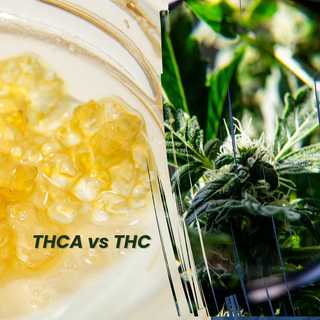Tetrahydrocannabinolic acid, commonly known as THCa, is the acidic form of THC or
Tetrahydrocannabinol, an active component of cannabis. The two components are often
mentioned together but are certainly not the same.
These two components differ from one another in various ways. THC, on the one hand, is a
renowned psychoactive compound that helps people by elevating their mood and providing
them with a stress-free and calm mind. While on the other hand, THCa is the acidic form of
THC but not as toxic as THC. THCa carries a wide range of therapeutic benefits, making it
more reliable for the pharmaceutical industry.
This is the most significant difference, though not the only one.
There's a lot more to discover here. Let's dive into the unknown world of THCa and THC and
find out more about how to handle them with caution.
What is THC?
Tetrahydrocannabinol, mostly known as THC, is the foremost psychoactive component
found in cannabis and is responsible for the euphoric feelings that the users experience.
Chemically, it is a cannabinoid vital in regulating multiple psychological and cognitive
phenomena associated with emotions, memory, and sensitivity.
THC mainly exerts its effects by binding to cannabinoid receptors, particularly the CB1
(Cannabinoid receptors 1) in the brain. This interaction influences neurotransmitter release,
altering mood, perception, and behavior. Expected outcomes of THC include nerve
relaxation, euphoria, altered sensory perception, and increased appetite.
Apart from its recreational uses, THC can widely be used for its extensive therapeutic
benefits. It has shown promising results in treating body aches, muscle contractions,
nausea, mood disorders, as well as some chronic conditions such as AIDS or Cancer.
Recent studies have shown that THC has some intriguing therapeutic properties that may
benefit patients. In this new era of medicine, THC has been seen to be used for its vast
therapeutic abilities.
Regardless of all its psychoactive and therapeutic abilities, THC remains a controversial
substance in the world of Narcotic Drugs (Schedule I and IV).
What is THCa?
THCa stands for tetrahydrocannabinolic acid. It is the acidic form of the psychoactive
substance THC, listed under Schedule I drug for its high potential for abuse. THCa is a non-
psychoactive cannabinoid substance, which makes it acceptable to the pharmaceutical
industries for its extensive ability of medical usage.
Tetrahydrocannabinolic acid, or THCa, and THC mainly differ in their chemical structure.
These are two different forms of the same compound. Tetrahydrocannabinol (THC)
comprises 30 hydrogen atoms, 21 carbon atoms, and two oxygen atoms, composing the
molecular formula of C₂₁H₃₀O₂. In the case of THCa, the chemical bond is similar to that
of THC, but it consists of an additional carboxyl group (-COOH). This insertion makes THCa
the acidic forefather of THC.
As the acidic precursor of THC, THCa is converted into a psychoactive substance by
performing phenomena commonly known as the Decarboxylation process. In this process,
THCa is produced by heating to break its molecular bond and to lose the carbon dioxide
bond to form THC.
Conversion
THCa is converted to THC through a phenomenon called Decarboxylation. THCa is the
acidic ancestor of THC produced by cannabis plants during their developmental stage. This
process is associated with the application of heat. When THCa is heated, it loses its carbon
dioxide (CO2) atom to form the new THC bond. The process of Decarboxylation occurs
organically when the THCa-rich cannabis flowers dry and age.
Therapeutic Benefits
THCa is now widely used for its high medicinal properties. It is believed to possess great
therapeutic approaches that can be used to treat chronic diseases. Some of the aspects
where it can be used as medicine include:
● Body aches
● Loss of appetite
● Muscle contractions
● Mood disorders
● Stress-related problems
● Insomnia
● Bodily discomfort
Common ways to consume THCa
THCa can be consumed in a variety of ways.
The most common and effective way to consume THCa is by inhaling it. To experience the
euphoric high, it can also be smoked by rolling it into Kapstone sheets or by vaporizing
THCa diamonds.
Apart from this, THCa also comes in the form of gummies and capsules made with a non-
psychoactive acidic form of THC, which can also be consumed for its vast medicinal
properties.
THCa and THC are also available in oil, balms, lotions, and creams. Many consumers use
these products to relieve body pains or bodily discomforts temporarily. Current research has
shown some promising therapeutic benefits in the medical aspect of THC and THCa.
Legality of Cannabis
Well, in the end, the controversy remains
regarding the legal status of THCa and
THC. The legality of these two drugs varies
accordingly.
In the United States, THCa is classified as a Schedule L drug by the Drug Enforcement
Administration (DEA) for its high potential for abuse.
The legal status varies extensively in different regions of the country, with some states
making the consumption of THCa legal as a psychoactive drug for its high recreational
characteristics and unique therapeutic properties. Some other states prohibit them due to the
extensive likelihood of consumer abuse.
Recently, the US President Joe Biden has officially announced the rescheduling of Cannabis
from Schedule l drug to Schedule lll substance. However, the controversy remains intact
regarding the legalization of THC and THCa across the globe.

